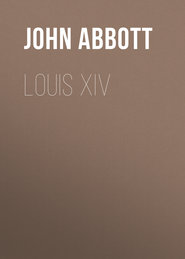По всем вопросам обращайтесь на: info@litportal.ru
(©) 2003-2024.
✖
Hortense. Makers of History Series
Настройки чтения
Размер шрифта
Высота строк
Поля
Josephine had ample means to indulge her taste in entertainments, and was qualified eminently to shine in such scenes. The consequence was that her saloons were the constant resort of rank and wealth and fashion. Some enemy wrote to Napoleon, and roused his jealousy to a very high degree, by representing Josephine as forgetting her husband, immersed in pleasure, and coquetting with all the world.
Napoleon was exceedingly disturbed, and wrote Josephine a very severe letter. The following extract from her reply fully explains the nature of this momentary estrangement:
Letter to Bonaparte.
"Is it possible, general, that the letter I have just received comes from you? I can scarcely credit it when I compare that letter with others to which your love imparts so many charms. My eyes, indeed, would persuade me that your hands traced these lines, but my heart refuses to believe that a letter from you could ever have caused the mortal anguish I experience on perusing these expressions of your displeasure, which afflict me the more when I consider how much pain they must have caused you.
"I know not what I have done to provoke some malignant enemy to destroy my peace by disturbing yours. But certainly a powerful motive must influence some one in continually renewing calumnies against me, and giving them a sufficient appearance of probability to impose on the man who has hitherto judged me worthy of his affection and confidence. These two sentiments are necessary to my happiness. And if they are to be so soon withdrawn from me, I can only regret that I was ever blest in possessing them or knowing you.
"On my first acquaintance with you, the affliction with which I was overwhelmed led me to believe that my heart must ever remain a stranger to any sentiment resembling love. The sanguinary scenes of which I had been a witness and a victim constantly haunted my thoughts. I therefore apprehended no danger to myself from the frequent enjoyment of your society. Still less did I imagine that I could for a single moment fix your choice.
"I, like every one else, admired your talents and acquirements. And better than any one else I foresaw your future glory. But still I loved you only for the services you rendered to my country. Why did you seek to convert admiration into a more tender sentiment, by availing yourself of all those powers of pleasing with which you are so eminently gifted, since, so shortly after having united your destiny with mine, you regret the felicity you have conferred upon me?
"Do you think I can ever forget the love with which you once cherished me? Can I ever become indifferent to the man who has blest me with the most enthusiastic and ardent passion? Can I ever efface from my memory your paternal affection for Hortense, the advice and example you have given Eugene? If all this appears impossible, how can you, for a moment, suspect me of bestowing a thought upon any but yourself?
"Instead of listening to traducers, who, for reasons which I can not explain, seek to disturb our happiness, why do you not silence them by enumerating the benefits you have bestowed on a woman whose heart could never be reached with ingratitude? The knowledge of what you have done for my children would check the malignity of these calumniators; for they would then see that the strongest link of my attachment for you depends on my character as a mother. Your subsequent conduct, which has claimed the admiration of all Europe, could have no other effect than to make me adore the husband who gave me his hand when I was poor and unfortunate. Every step you take adds to the glory of the name I bear. Yet this is the moment which has been selected for persuading you that I no longer love you! Surely nothing can be more wicked and absurd than the conduct of those who are about you, and are jealous of your marked superiority.
"Yes, I still love you, and no less tenderly than ever. Those who allege the contrary know that they speak falsely. To those very persons I have frequently written to inquire about you, and to recommend them to console you, by their friendship, for the absence of her who is your best and truest friend.
"I acknowledge that I see a great deal of company; for every one is eager to compliment me on your success, and I confess that I have not resolution to close my door against those who speak of you. I also confess that a great portion of my visitors are gentlemen. Men understand your bold projects better than women; and they speak with enthusiasm of your glorious achievements, while my female friends only complain of you for having carried away their husbands, brothers, or fathers.
"I take no pleasure in their society if they do not praise you. Yet there are some among them whose hearts and understandings claim my highest regard, because they entertain sincere friendship for you. In this number I may mention ladies Arquillon, Tallien, and my aunt. They are almost constantly with me; and they can tell you, ungrateful as you are, whether I have been coquetting with every body. These are your words. And they would be hateful to me were I not certain that you had disavowed them, and are sorry for having written them.
"I sometimes receive honors here which cause me no small degree of embarrassment. I am not accustomed to this sort of homage. And I see that it is displeasing to our authorities, who are always suspicious and fearful of losing their newly-gotten power. If they are envious now, what will they be when you return crowned with fresh laurels? Heaven knows to what lengths their malignity will then carry them. But you will be here, and then nothing can vex me.
"But I will say no more of them, nor of your suspicions, which I do not refute one by one, because they are all equally devoid of probability. And to make amends for the unpleasant commencement of this letter, I will tell you something which I know will please you.
"Hortense, in her efforts to console me, endeavors as far as possible to conceal her anxiety for you and her brother. And she exerts all her ingenuity to banish that melancholy, the existence of which you doubt, but which I assure you never forsakes me. If by her lively conversation and interesting talents she sometimes succeeds in drawing a smile, she joyfully exclaims, 'Dear mamma, that will be known at Cairo.' The fatal word immediately calls to my mind the distance which separates me from you and my son, and restores the melancholy which it was intended to divert. I am obliged to make great efforts to conceal my grief from my daughter, who, by a word or a look, transports me to the very place which she would wish to banish from my thoughts.
"Hortense's figure is daily becoming more and more graceful. She dresses with great taste; and though not quite so handsome as your sisters, she may certainly be thought agreeable when even they are present.
"Heaven knows when or where you may receive this letter. May it restore you to that confidence which you ought never to have lost, and convince you, more than ever, that, long as I live, I shall love you as dearly as I did on the day of our separation. Adieu. Believe me, love me, and receive a thousand kisses.
"Josephine."
Madame Campan.
There was at that time a very celebrated female school at St. Germain, under the care of Madame Campan. This illustrious lady was familiar with all the etiquette of the court, and was also endowed with a superior mind highly cultivated. At the early age of fifteen she had been appointed reader to the daughter of Louis XV. Maria Antoinette took a strong fancy to her, and made her a friend and companion. The crumbling of the throne of the Bourbons and the dispersion of the court left Madame Campan without a home, and caused what the world would call her ruin.
But in the view of true intelligence this reverse of fortune only elevated her to a far higher position of responsibility, usefulness, and power. Impelled by necessity, she opened a boarding-school for young ladies at St. Germain. The school soon acquired celebrity. Almost every illustrious family in France sought to place their daughters under her care. She thus educated very many young ladies who subsequently occupied very important positions in society as the wives and mothers of distinguished men. Some of her pupils attained to royalty. Thus the boarding-school of Madame Campan became a great power in France.
School-girl days.
Hortense was sent to this school with Napoleon's sister Caroline, who subsequently became Queen of Naples, and with Stephanie Beauharnais, to whom we shall have occasion hereafter to refer as Duchess of Baden. Stephanie was a cousin of Hortense, being a daughter of her father's brother, the Marquis de Beauharnais.
In this school Hortense formed many very strong attachments. Her most intimate friend, however, whom she loved with affection which never waned, was a niece of Madame Campan, by the name of Adèle Auguié, afterwards Madame de Broc, whose sad fate, hereafter to be described, was one of the heaviest blows which fell upon Hortense. It would seem that Hortense was not at all injured by the flattery lavished upon her in consequence of the renown of her father. She retained, unchanged, all her native simplicity of character, which she had inherited from her mother, and which she ever saw illustrated in her mother's words and actions. Treating the humblest with the same kindness as the most exalted, she won all hearts, and made herself the friend of every one in the school.
But her cousin Stephanie was a very different character. Her father, the Marquis, had fled from France an emigrant. He was an aristocrat by birth, and in all his cherished sentiments. In his flight with the nobles, from the terrors of the revolution, he had left his daughter behind, as the protégée of Josephine. Inheriting a haughty disposition, and elated by the grandeur which her uncle was attaining, she assumed consequential airs which rendered her disagreeable to many of her companions. The eagle eye of Josephine detected these faults in the character of her niece. As Stephanie returned to school from one of her vacations, Josephine sent by her the following letter to Madame Campan:
Letter from Josephine.
"In returning to you my niece, my dear Madame Campan, I send you both thanks and reproof:—thanks for the brilliant education you have given her, and reproof for the faults which your acuteness must have noticed, but which your indulgence has passed over. She is good-tempered, but cold; well-informed, but disdainful; lively, but deficient in judgment. She pleases no one, and it gives her no pain. She fancies the renown of her uncle and the gallantry of her father are every thing. Teach her, but teach her plainly, without mincing, that in reality they are nothing.
"We live in an age when every one is the child of his own deeds. And if they who fill the highest ranks of public service enjoy any superior advantage or privilege, it is the opportunity to be more useful and more beloved. It is thus alone that good fortune becomes pardonable in the eyes of the envious. This is what I would have you repeat to her constantly. I wish her to treat all her companions as her equals. Many of them are better, or at least quite as deserving as she is herself, and their only inferiority is in not having had relations equally skillful or equally fortunate.
"Josephine Bonaparte."
Napoleon's return from Egypt.
On the 8th of October, 1799, Napoleon landed at Fréjus, on his return from Egypt. His mind was still very much disturbed with the reports which had reached him respecting Josephine. Fréjus was six hundred miles from Paris—a long journey, when railroads were unknown. The intelligence of his arrival was promptly communicated to the metropolis by telegraph. Josephine received the news at midnight. Without an hour's delay she entered her carriage with Hortense, taking as a protector Napoleon's younger brother Louis, who subsequently married Hortense, and set out to meet her husband. Almost at the same hour Napoleon left Fréjus for Paris.
Josephine's anguish.
When Josephine reached Lyons, a distance of two hundred and forty-two miles from Paris, she learned, to her consternation, that Napoleon had left the city several hours before her arrival, and that they had passed each other by different roads. Her anguish was dreadful. For many months she had not received a line from her husband, as all communication had been intercepted by the British cruisers. She knew that her enemies would be busy in poisoning the mind of her husband against her. She had traversed the weary leagues of her journey without a moment's intermission, and now, faint, exhausted, and despairing, she was to retrace her steps, to reach Paris only many hours after Napoleon would have arrived there. Probably in all France there was not then a more unhappy woman than Josephine.
Jealousy of Napoleon.
The mystery of human love and jealousy no philosophy can explain. Secret wretchedness was gnawing at the heart of Napoleon. He loved Josephine with intensest passion, and all the pride of his nature was roused by the conviction that she had trifled with him. With these conflicting emotions rending his soul, he entered Paris and drove to his dwelling. Josephine was not there. Even Josephine had bitter enemies, as all who are in power ever must have. These enemies took advantage of her absence to fan the flames of that jealousy which Napoleon could not conceal. It was represented to him that Josephine had fled from her home, afraid to meet the anger of her injured husband. As he paced the floor in anguish, which led him to forget all his achievements in the past and all his hopes for the future, an enemy maliciously remarked,
"Josephine will soon appear before you with all her arts of fascination. She will explain matters, you will forgive all, and tranquillity will be restored."
Napoleon, striding nervously up and down the floor, replied with pallid cheek and trembling lip,
"Never! never! Were I not sure of my resolution, I would tear out this heart and cast it into the fire."
Eugene had returned with Napoleon. He loved his mother to adoration. Anxiously he sat at the window watching, hour after hour, for her arrival. At midnight on the 19th the rattle of her carriage-wheels was heard, as she entered the court-yard of their dwelling in the Rue Chantereine. Eugene rushed to his mother's arms. Napoleon had ever been the most courteous of husbands. Whenever Josephine returned, even from an ordinary morning drive, he would leave any engagements to greet her as she alighted from her carriage. But now, after an absence of eighteen months, he remained sternly in his chamber, the victim of almost unearthly misery.
The meeting in Paris.
The cruel repulse.
In a state of terrible agitation, with limbs tottering and heart throbbing, Josephine, assisted by Eugene and accompanied by Hortense, ascended the stairs to the parlor where she had so often received the caresses of her husband. She opened the door. Napoleon stood before her, pale, motionless as a marble statue. Without one kind word of greeting he said sternly, in words which pierced her heart,
"Madame, it is my wish that you retire immediately to Malmaison."
The meek and loving Josephine uttered not a word. She would have fallen senseless to the floor, had she not been caught in the arms of her son. It was midnight. For a week she had lived in her carriage almost without sleep. She was in a state of utter exhaustion, both of body and of mind. It was twelve miles to Malmaison. Napoleon had no idea that she would leave the house until the morning. Much to his surprise, he soon heard the carriage in the yard, and Josephine, accompanied by Eugene and Hortense, descending the stairs. The naturally kind heart of Napoleon could not assent to such cruelty. Immediately going down into the yard, though his pride would not permit him to speak to Josephine, he addressed Eugene, and requested them all to return for refreshment and repose.
In silent submission, Eugene and Hortense conducted their mother to her apartment, where she threw herself upon her couch in abject misery. In equally sleepless woe, Napoleon retired to his cabinet. Two days of wretchedness passed away. On the third, the love for Josephine, which still reigned in the heart of Napoleon, so far triumphed that he entered her apartment. Josephine was seated at a toilette-table, with her head bowed, and her eyes buried in her handkerchief. The table was covered with the letters which she had received from Napoleon, and which she had evidently been perusing. Hortense, the victim of grief and despair, was standing in the alcove of a window.
The reconciliation.
Apparently Josephine did not hear the approaching footsteps of her husband. He advanced softly to her chair, placed his hand upon it, and said, in tones almost of wonted kindness, "Josephine." She started at the sound of that well-known and dearly-loved voice, and turning towards him her swollen and flooded eyes, responded, "My dear." The words of tenderness, the loving voice, brought back with resistless rush the memory of the past. Napoleon was vanquished. He extended his hand to Josephine. She rose, threw her arms around his neck, rested her throbbing, aching head upon his bosom, and wept in convulsions of anguish. A long explanation ensued. Napoleon again pressed Josephine to his loving heart, satisfied, perfectly satisfied that he had deeply wronged her; that she had been the victim of base traducers. The reconciliation was perfect.
Napoleon First Consul.
Soon after this Napoleon overthrew the Directory, and established the Consulate. This was on the ninth of November, 1799, usually called 18th Brumaire. Napoleon was thirty years of age, and was now First Consul of France. After the wonderful achievements of this day of peril, during which Napoleon had not been able to send a single line to his wife, at four o'clock in the morning he alighted from his carriage at the door of his dwelling at the Rue Chantereine. Josephine, in a state of great anxiety, was watching at the window for his approach. She sprang to meet him. Napoleon encircled her in his arms, and briefly recapitulated the memorable scenes of the day. He assured her that since he had taken the oath of office, he had not allowed himself to speak to a single individual, for he wished the beloved voice of his Josephine might be the first to congratulate him upon his virtual accession to the Empire of France. Throwing himself upon a couch for a few moments of repose, he exclaimed gayly, "Good-night, my Josephine. To-morrow we sleep in the palace of the Luxembourg."
The Luxembourg.











